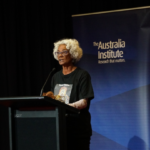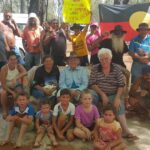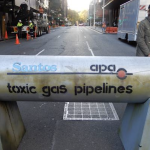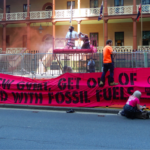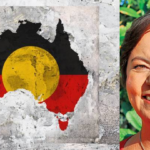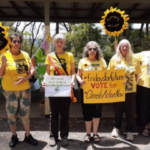Gomeroi Ready to Fight Santos Gas Project Any Way Possible, Says Elder Maria “Polly” Cutmore
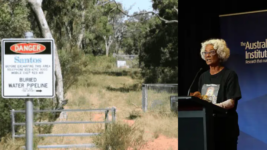
The National Native Title Tribunal released its final decision on whether the New South Wales government can lease Gomeroi Country to Australian fossil fuel giant Santos for coal seam gas purposes on 19 May 2025, greenlighting the process again, after the Federal Court required it to reassess its original determination of December 2022, because the initial decision had not considered climate change.
The 2022 NNTT determination considered Santos’ planned $3.5 billion Narrabri gas project, which encompasses around 95,000 hectares of the Pilliga Forest and other surrounding Gomeroi Country, posed no substantial environmental issues, despite its involving drilling 850 coal seam gas wells straight through the Great Artesian Basin: one of the largest freshwater reserves in the world.
The Gomeroi Nation appealed the NNTT’s determination to the court, with it ruling in its April 2024 findings that the challenge was successful as the tribunal had not considered planetary heating in terms of the gas project’s emissions impact. But in its current determination, the NNTT says that while the project is not the sole cause of climate change, its contribution is “a serious detriment”.
However, in considering the public interest value of the project, the NNTT has highlighted that this gas would be for the domestic market, and if the leases are denied, “there will likely be a gap in the available supply of reliable, secure energy on Australia’s east coast, which would have significant short-to-medium-term detrimental impacts upon the wider community, including Gomeroi people”.
Quick hit profiteering from desecrating Country
But the truth of the matter is that the potential gaps in gas supply that the NNTT’s new determination envisages, and in fact, the entire gas shortages the nation of Australia has been having a meltdown about over recent years, are all due to the fact that most of the gas extracted here is sold to foreign markets by multinational companies.
This means if current gas projects that have already destroyed the lands of various First Nations were now redirected to be used domestically and not sold for profit by corporations to the benefit of communities overseas, there would be no reason whatsoever to be conducting this current assault upon Gomeroi Country and the Gomeroi people.
Sydney Criminal Lawyers spoke to Gomeroi elder Aunty Maria “Polly” Cutmore about the destruction of culture and Country the Santos project is threatening, the fact that despite what the tribunal says, the gas is of no use to the Gomeroi, and how the fight to preserve Gomeroi Country is far from over.
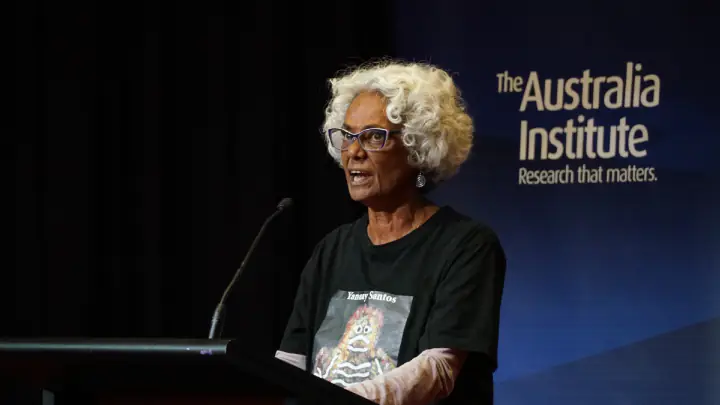
Aunty Polly, on 19 May, the National Native Title Tribunal ruled that following its court-ordered redetermination of its 2022 decision to allow the NSW government to lease Gomeroi Country to Santos, it will still be greenlighting the project.
The NNTT said it has assessed the situation and found it offers a “net public benefit”.
What is the NNTT missing in making such an assessment? While the decision seems to consider a majority of the public will benefit from it, what would the project mean for Gomeroi people if it does go ahead?
It’s going to be devastating. They didn’t take into consideration anything the Gomeroi people put to Santos.
Everything that they agreed to we already reject during our native title negotiations with Santos, and so did our people, 162 people voted against it.
They already rejected all that with Santos and they agreed that it wasn’t good enough for us, and that the gas was going to affect us, especially our people that live along the Murray-Darling Basin.
The Great Artesian Basin, our groundwater, and everything around it is going to be suffering from it, and then there’s climate change. We have already been suffering the effects up until now.
So, you’re saying that the Federal Court told the tribunal to reconsider the decision with the added addition of looking at climate change, and then they didn’t really consider these extra impacts anyway?
They didn’t look at it. That evidence from Will Steffen, they didn’t even look at his evidence at all. Everything that we put up, they ignored.
The bringing all of our people together over this, that’s the first time, in NSW, that’s happened. But they didn’t believe the cultural evidence from our elders.
One hundred and twenty or 150 years ago, they all stood around to teach us. But we know our culture, and we know how to make cultural decisions not just for today but for the future.
But these fellas, didn’t take any of this into consideration. And to think that all the gas is not going to affect us over the next 20 to 30 years, we had rejected all that.
Not only would the project have a devastating effect specifically on Gomeroi people, but Santos plans to drill all these wells straight through the Great Artesian Basin.
So, what are the environmental effects this project would result in that the NNTT considers are of “net public benefit”?
The Great Artesian Basin is clean drinking water. That is what it is to us.
In times of flood and in times of drought: that Great Artesian water is the only thing that sustains us and our land, and that is everything that is on that land.
Even the farmland now, the water sustains that in times of drought.
With 850 wells over there, with one little slip, it is all gone. How can that happen? These people have no evidence that it will be done right and that it is not going to affect us.
They haven’t proven anything to us. They have not proven that it’s not going to damage our environment.
It might be a small little thing to them. But in that small little environment, there may be a Pilliga Mouse that lives there, which is an endangered species, and they haven’t even looked at that.
The NNTT state’s its new determination that it did consider the climate effect, but there might be a gap in reliable supply of energy on the east coast of Australia if it doesn’t go ahead and it stressed that this could affect the Gomeroi people as well.
How do you consider the logic of the NNTT in this part of its decision?
What benefit are we going to have from the gas. We are out here. We aren’t going to get any benefits from the gas.
The only people who are really going to benefit from the gas are the people on the east coast, down in the cities, not us regional people out here on Gomeroi.
Gomeroi is not down in the city. We are not down in those big steel places. What we need up here is clean water and clean land.
We don’t need gas in our Country. We are not going to be using that up here.
Gas is something that we do not need to use. It is just the fossil fuel industry – the cartel – telling lies again.
We all know there is no shortage of gas already. Gomeroi people know that. So, why don’t the government and Santos know that?
The other thing is, we don’t want it. One hundred and sixty-two of us voted against it and the taking our cultural rights away.
There is a popularly held belief amongst many in the population regarding the colonisation of this continent as being something that happened in the past.
So, while First Nations people were dispossessed of their land and genocide was committed upon them to achieve this, these events happened long ago and are over.
So, what does the current debate over Santos attempting to acquire Gomeroi Country to basically destroy it for extractive purposes tell us about this idea that colonisation is something in the past?
It is not in the past. I am a 63-year-old. I was born in the Aboriginal hospital in Moree. I am still alive. I went to an Aboriginal school. I am still alive.
I am third generation from the Aboriginal mission. I left the mission in 1971 and also went to the school there.
Everything that is happening today is because of colonisation. We are kept down because of colonisation. That is why this is going on, because they want to continue with their colonisation on us.
There has been no benefit for us. There has not been any benefit from anything. Not even the cotton industry.
They told us the cotton industry was a big booming industry, but we are still living in third world conditions.
That’s what we even said to Santos, “You want to offer us first class facilities while mining gas on our Country, but we are living in third world conditions.”
The houses that we are living in, some of them are housing commission that are more than 70 years old. It is older than me, and that is what we are living in.
That is what the NSW government offers us in our regional areas. And there is no gas in these homes.
In my understanding, the Gomeroi people are obliged to continue to fight the establishment of the Santos gas project on Country, and there are still a number of legal avenues to prevent the project going ahead, as well as other circumstances that might make it unviable, including a yet to be approved pipeline.
So, Aunty Polly, what’s next from here in terms of the campaign against the project? What are the Gomeroi people planning on doing next?
The Nation will have to come together and decide what action they will take. We are waiting to hear from our native title advocates to see where we will go from here.
But I’ve had a number of calls. I have had hundreds of messages, saying that they are ready to come to fight in any way possible, which ever avenue we have to take.
We are looking at everything now, because now, we have been informed about what they want.
Every Gomeroi person knows now what is going on. They can’t keep it a secret anymore, and we’re coming.
I did say to Santos when we were in the negotiating room that one thing they have done is that they have brought us First Nations people together, because they keep trying to poison our rivers and waters and we are all awake to their system.
We are coming together. So, they better be ready for us, and I don’t think they are.


